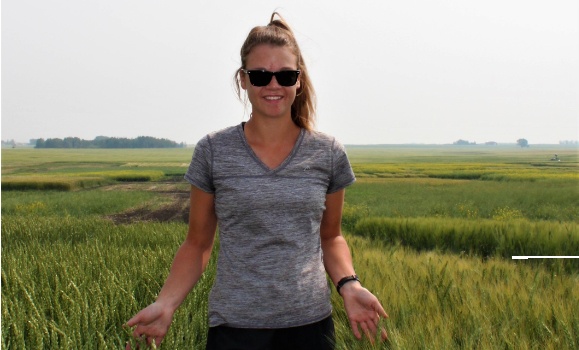News
» Go to news mainA fascination with plants

A long-time fascination with plants first led Emily Johnstone (Class of ’16 and ’23) to the Faculty of Agriculture for an undergraduate degree in plant science. At the time, she didn’t know much about post-secondary education, agriculture, or what kind of career she wanted to pursue. Ten years, two degrees, and one pandemic later, all of that has changed.
“I had so many supportive instructors during my undergrad,” says Emily. “I developed a well-rounded appreciation for agriculture, and decided I wanted to focus my career in the industry.”
After graduating in 2016, Emily’s search for employment in the agriculture industry took her to Alberta, where she started her journey in field crop research.
“I was a research technician at Olds College working on late-stage development of crop protectants and germplasm screening in a small plot setting,” she explains.
Emily spent two years in this position and got her first real exposure to crop research. She loved it. “I learned that I really enjoyed working outside and that every day and every season brought something different. I was able to employ what I learned in school and build upon that knowledge.”
After four years in the workforce, getting to know a wide variety of crops, Emily came around to the idea of pursuing a Master of Science – an idea she hadn’t originally considered. In the face of a global pandemic and employment uncertainty, Emily realized two things: that she wanted to advance her education to continue working in agronomy, and that she wanted to be home in the Maritimes.
She started her graduate studies during the COVID-19 pandemic, conducting her research in Charlottetown, PE, rather than in Truro. Since inter-provincial travel wasn’t an option for long stretches of time, Emily and her supervisors had to find creative solutions.
“My project was funded by Agriculture and Agri-Food Canada in partnership with the Atlantic Grains Council, and the research was to be conducted in Charlottetown under the supervision of Dr. Adam Foster,” she explains. “I was hired to work on the project as a graduate student and would complete coursework and be co-supervised by Dr. Nancy McLean at the Faculty of Agriculture.”
The original plan, before knowing how long travel restrictions would last, was for Emily to work on field, lab, and greenhouse components in Charlottetown from spring to fall, and complete coursework in Truro during the winter semesters. As with much of the pandemic, things didn’t exactly go according to plan.
“When travel became possible and in-person learning returned in the fall of 2021, I was deep in lab work and processing field samples, and the courses I needed didn’t line up with the original winter semester plan,” she explains. “Luckily my instructors were very open to having me participate remotely.”
By the end of her studies, Emily only ended up coming to campus three times – once to meet in person with a committee member, one day to test technology and do a practice run for her thesis defence with Dr. McLean, and finally, the following day to do her actual defence.
Emily’s graduate research focused on the causal species of Fusarium head blight (FHB) of wheat and barley in the Maritimes. She sought to characterize the Fusarium population by species and mycotoxin types, and reviewed several disease forecasting models and their ability to accurately predict FHB epidemics in the region.
“Initially I didn’t know if pursuing grad studies was the right choice for me,” Emily says. “But I’m glad I finally did it , even though the experience wasn’t a typical one. I got to continue developing my skills as a field crop researcher and develop new skills in a tissue culture and molecular biology lab to round out my resume.”
Following completion of her MSc in the spring of 2023, Emily began work as a research technician with Agriculture and Agri-Food Canada in Charlottetown. In this role, she is continuing with research on FHB, also known as scab, which is a serious fungal disease in cereals . FHB can impact crop yield, grade and quality .
“It’s nice to know that my grad research was important and useful, and to get to continue with this work is an added bonus ,” she says. “In addition to FHB research, I also get to study other cereal and oilseed pathogens of interest in the Maritimes.”
Emily’s commitment to field crop research is making a difference. “Emily works to find practical solutions for farmers in order to provide productive, profitable crop production while enhancing ecosystems,” says her supervisor, Dr. Nancy McLean. “She has developed a keen interest in best management practices for crop production and I believe this stems from a sincere concern for and love of the environment.”
Ten years, two degrees, and one pandemic later, it’s clear that Emily has found her calling in agronomy – and the agriculture industry is better for it.
“I love being able to study new ideas and integrated approaches that can improve best management practices for producers, especially in the Maritimes.”
Recent News
- Holiday Hours
- From Academia to Agriculture: Former PhD student and supervisor launch innovative vertical farming venture
- Community Representative ‑ Animal Care and Use
- New Face on Campus
- Sowing Seeds of Knowledge: A Gardener’s Journey with DeAnne Pelchat
- Dalhousie Advising Summit
- Legacy Awards 2024
- Fall Food Drive
